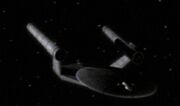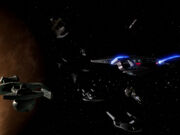m (Robot: Automated text replacement (-Image: +File:) !!wikia-credits fix!!) |
m (+staffers) Tag: sourceedit |
||
| (11 intermediate revisions by 8 users not shown) | |||
| Line 1: | Line 1: | ||
{{realworld}} |
{{realworld}} |
||
| − | [[File: |
+ | [[File:Phase II Enterprise, aft.jpg|thumb|{{USS|Enterprise|NCC-1701}} concept painting by Ralph McQuarrie]] |
'''''Star Trek: Planet of the Titans''''' (alternatively called '''''Star Trek: Planet of Titans''''') was to have been the first motion picture based on ''[[Star Trek: The Original Series]]''. It was one of several early attempts to bring ''[[Star Trek]]'' back after the series had been canceled. The film was in development from {{y|1976}} through {{y|1977}} before being abandoned. |
'''''Star Trek: Planet of the Titans''''' (alternatively called '''''Star Trek: Planet of Titans''''') was to have been the first motion picture based on ''[[Star Trek: The Original Series]]''. It was one of several early attempts to bring ''[[Star Trek]]'' back after the series had been canceled. The film was in development from {{y|1976}} through {{y|1977}} before being abandoned. |
||
| Line 7: | Line 7: | ||
==History== |
==History== |
||
| − | [[File:B-24-CLN.jpg|thumb| |
+ | [[File:B-24-CLN.jpg|thumb|USS ''Enterprise'' study model designed by Adam and McQuarrie for ''Planet of the Titans'', ultimately seen in {{e|Unification I}} as the "[[B-24-CLN]]"]] |
The film was to be produced in England, with Jerry Isenberg serving as executive producer. Hired to direct the film was Philip Kaufman, later known for directing such films as ''Invasion of the Body Snatchers'' (starring [[Leonard Nimoy]]), ''The Right Stuff'', and ''The Unbearable Lightness of Being''. |
The film was to be produced in England, with Jerry Isenberg serving as executive producer. Hired to direct the film was Philip Kaufman, later known for directing such films as ''Invasion of the Body Snatchers'' (starring [[Leonard Nimoy]]), ''The Right Stuff'', and ''The Unbearable Lightness of Being''. |
||
| − | [[Ken Adam]] of ''James Bond'' fame was hired to be the film's production designer. Adam sketched new concepts for the starship ''Enterprise'' featuring a flattened triangular engineering hull. Artist |
+ | [[Ken Adam]] of ''James Bond'' fame was hired to be the film's production designer. Adam sketched new concepts for the starship ''Enterprise'' featuring a flattened triangular engineering hull. Artist Ralph McQuarrie, of ''Star Wars'' fame, was hired to do conceptual drawing and paintings, featuring variations on Adam's ''Enterprise'', many of which were speculative images not based on the then-unfinished script, such as images of the starship approaching an inhabited asteroid. (''[[The Art of Ralph McQuarrie]]'') |
British writers Chris Bryant and Allan Scott wrote the initial fifteen-to-twenty page treatment which, upon acceptance from [[Paramount Pictures]], they turned into a screenplay, which was submitted on {{d|1|March|1977}}. The [[April 1977|following month]], the script was rejected by Paramount. Kaufman then took on the task of writing the script, in which he wanted to focus on Spock and a Klingon character he envisioned being played by legendary Japanese actor Toshiro Mifune. Kaufman's script was never completed, as Paramount pulled the plug in [[May 1977|May]], just weeks before the release of ''Star Wars''. Initially budgeted at US$7.5 million, the film had an estimated budget of US$10 million at the time project was halted. |
British writers Chris Bryant and Allan Scott wrote the initial fifteen-to-twenty page treatment which, upon acceptance from [[Paramount Pictures]], they turned into a screenplay, which was submitted on {{d|1|March|1977}}. The [[April 1977|following month]], the script was rejected by Paramount. Kaufman then took on the task of writing the script, in which he wanted to focus on Spock and a Klingon character he envisioned being played by legendary Japanese actor Toshiro Mifune. Kaufman's script was never completed, as Paramount pulled the plug in [[May 1977|May]], just weeks before the release of ''Star Wars''. Initially budgeted at US$7.5 million, the film had an estimated budget of US$10 million at the time project was halted. |
||
''Planet of the Titans'' was shelved and never revisited. Paramount next moved ahead with a proposed ''[[Star Trek: Phase II]]'' TV series, which eventually became {{film|1}}. |
''Planet of the Titans'' was shelved and never revisited. Paramount next moved ahead with a proposed ''[[Star Trek: Phase II]]'' TV series, which eventually became {{film|1}}. |
||
| + | |||
| + | *For a more detailed breakdown of the production history, please see: [[Star Trek: The Motion Picture#Production history|''Star Trek: The Motion Picture'' production history]] |
||
==Study models== |
==Study models== |
||
| ⚫ | |||
| − | {| style="float:right;" |
||
| ⚫ | |||
| − | |<gallery> |
||
| ⚫ | Several small [[study model]]s of the ''Enterprise'' designs were created during the project's short life, of which two at least made an appearance in later ''Star Trek'' productions. Stored away for the better part of a decade they have been stated to have appeared in the "starship graveyard" scene in the aftermath of the [[Battle of Wolf 359]] in {{TNG|The Best of Both Worlds, Part II}} (''[[The Art of Star Trek]]'', page 56), though their presence there has not been confirmed. {{eas|articles/wolf359.htm}} One of the models was partially visible behind the hub of the [[spacedock]] in {{film|3}} when the ''Enterprise'' enters. |
||
| ⚫ | |||
| ⚫ | |||
| ⚫ | |||
| ⚫ | |||
| − | </gallery> |
||
| − | |} |
||
| ⚫ | Several small study |
||
| ⚫ | |||
| ⚫ | |||
| + | The other model was present as [[B-24-CLN]] at the [[Surplus Depot Z15]] in {{TNG|Unification I}}. Both models therefore became [[canon]] albeit without class designations or names. The B-24-CLN study model, constructed out of wood and plastic, detailed with hand-applied tape and ink and measuring 15" × 8", eventually turned up on 8 August 2010 as [http://archive.propworx.com/1008/12 Lot #12] in the [[Propworx]]'s "Star Trek Prop and Costume Auction", estimated at US$1,000-$2,000, where it sold for US$3,500. |
||
| + | |||
| + | ==Pre-production staff== |
||
| + | :''note: † - as identified by former ''[[Cinefex]]'' reference author Kevin H. Martin {{DrexFiles|2009/03/05/tholian-asteroid-dock-mirror-darkly/#comment-2482}}'' |
||
| + | *[[Ken Adam]] - Production Designer |
||
| + | *{{w|Jordan Belson}}† - Visual Effects/Opticals |
||
| + | *[[Chris Bryant]] - Teleplay |
||
| + | *[[Jerry Isenberg]] - Executive Producer |
||
| + | *[[Philip Kaufman]] - Director |
||
| + | *[[Ralph McQuarrie]] - Production/Concept Illustrator |
||
| + | *{{w|Derek Meddings}}† - Miniatures/Studio Models |
||
| + | *[[Jon Povill]] - Associate Producer |
||
| + | *[[Allan Scott]] - Teleplay |
||
{{UndevelopedSpinOffs}} |
{{UndevelopedSpinOffs}} |
||
| + | |||
| − | [[ |
+ | [[it:Star Trek: Planet of the Titans]] |
| + | [[Category:Undeveloped projects|Planet of the Titans]] |
||
Revision as of 16:03, 30 September 2015
Template:Realworld
USS Enterprise concept painting by Ralph McQuarrie
Star Trek: Planet of the Titans (alternatively called Star Trek: Planet of Titans) was to have been the first motion picture based on Star Trek: The Original Series. It was one of several early attempts to bring Star Trek back after the series had been canceled. The film was in development from 1976 through 1977 before being abandoned.
Summary
Set after the five-year mission depicted in the series, the film involved Starfleet competing with the Klingons for claim to the supposed homeworld of the mythical Titans, a technologically-advanced race long thought extinct. As the planet is pulled into a black hole, the USS Enterprise must also face off against the Cygnans, the alien race responsible for the Titans' disappearance. Ultimately, Captain Kirk is forced to take the Enterprise into the black hole to defeat the Cygnans, a decision that sends the starship and its crew backwards in time thousands of years and into orbit around Earth. After introducing fire to the primitive Humans living at the time, Kirk and his crew are revealed to be the legendary Titans. (The Making of Star Trek: The Motion Picture)
History

USS Enterprise study model designed by Adam and McQuarrie for Planet of the Titans, ultimately seen in "Unification I" as the "B-24-CLN"
The film was to be produced in England, with Jerry Isenberg serving as executive producer. Hired to direct the film was Philip Kaufman, later known for directing such films as Invasion of the Body Snatchers (starring Leonard Nimoy), The Right Stuff, and The Unbearable Lightness of Being.
Ken Adam of James Bond fame was hired to be the film's production designer. Adam sketched new concepts for the starship Enterprise featuring a flattened triangular engineering hull. Artist Ralph McQuarrie, of Star Wars fame, was hired to do conceptual drawing and paintings, featuring variations on Adam's Enterprise, many of which were speculative images not based on the then-unfinished script, such as images of the starship approaching an inhabited asteroid. (The Art of Ralph McQuarrie)
British writers Chris Bryant and Allan Scott wrote the initial fifteen-to-twenty page treatment which, upon acceptance from Paramount Pictures, they turned into a screenplay, which was submitted on 1 March 1977. The following month, the script was rejected by Paramount. Kaufman then took on the task of writing the script, in which he wanted to focus on Spock and a Klingon character he envisioned being played by legendary Japanese actor Toshiro Mifune. Kaufman's script was never completed, as Paramount pulled the plug in May, just weeks before the release of Star Wars. Initially budgeted at US$7.5 million, the film had an estimated budget of US$10 million at the time project was halted.
Planet of the Titans was shelved and never revisited. Paramount next moved ahead with a proposed Star Trek: Phase II TV series, which eventually became Star Trek: The Motion Picture.
- For a more detailed breakdown of the production history, please see: Star Trek: The Motion Picture production history
Study models

USS Enterprise study model
...in Earth Spacedock
Several small study models of the Enterprise designs were created during the project's short life, of which two at least made an appearance in later Star Trek productions. Stored away for the better part of a decade they have been stated to have appeared in the "starship graveyard" scene in the aftermath of the Battle of Wolf 359 in TNG: "The Best of Both Worlds, Part II" (The Art of Star Trek, page 56), though their presence there has not been confirmed. [1] One of the models was partially visible behind the hub of the spacedock in Star Trek III: The Search for Spock when the Enterprise enters.

B-24-CLN study model

...at Surplus Depot Z15 (b)
The other model was present as B-24-CLN at the Surplus Depot Z15 in TNG: "Unification I". Both models therefore became canon albeit without class designations or names. The B-24-CLN study model, constructed out of wood and plastic, detailed with hand-applied tape and ink and measuring 15" × 8", eventually turned up on 8 August 2010 as Lot #12 in the Propworx's "Star Trek Prop and Costume Auction", estimated at US$1,000-$2,000, where it sold for US$3,500.
Pre-production staff
- Ken Adam - Production Designer
- Jordan Belson† - Visual Effects/Opticals
- Chris Bryant - Teleplay
- Jerry Isenberg - Executive Producer
- Philip Kaufman - Director
- Ralph McQuarrie - Production/Concept Illustrator
- Derek Meddings† - Miniatures/Studio Models
- Jon Povill - Associate Producer
- Allan Scott - Teleplay
Template:UndevelopedSpinOffs
